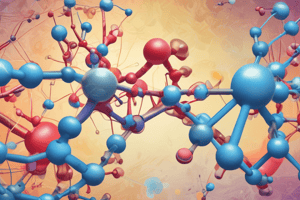Podcast
Questions and Answers
What type of reactive species are formed during reactions involving double bonds in organic chemistry?
What type of reactive species are formed during reactions involving double bonds in organic chemistry?
- Carbanions and carbocations (correct)
- Free radicals and radicals
- Nucleophiles and electrophiles
- Anions and cations
How do chemists achieve selective bond formation pathways in organic reactions?
How do chemists achieve selective bond formation pathways in organic reactions?
- By reducing the catalyst presence
- By increasing the pressure only
- By using only high temperature
- By manipulating reaction conditions (correct)
What synthetic strategy involves the use of transition metal-catalyzed cross coupling?
What synthetic strategy involves the use of transition metal-catalyzed cross coupling?
- Cross metathesis reactions (correct)
- Stepwise condensation reactions
- Radical polymerization
- Biomimetic approaches
Which modern technique is utilized to expand researchers' capabilities in designing novel organic compounds?
Which modern technique is utilized to expand researchers' capabilities in designing novel organic compounds?
What have natural products derived from plants, microorganisms, and other sources inspired in drug discovery?
What have natural products derived from plants, microorganisms, and other sources inspired in drug discovery?
How has the study of organic chemistry contributed to modern drug design?
How has the study of organic chemistry contributed to modern drug design?
What is the key feature of carbon that allows it to form diverse structures in organic compounds?
What is the key feature of carbon that allows it to form diverse structures in organic compounds?
Which type of functional group is represented by -OH and imparts specific properties to organic compounds?
Which type of functional group is represented by -OH and imparts specific properties to organic compounds?
How many atoms can a carbon atom bind with due to its four valence electrons?
How many atoms can a carbon atom bind with due to its four valence electrons?
Which type of bond allows carbon to create chains, rings, and complex networks in organic compounds?
Which type of bond allows carbon to create chains, rings, and complex networks in organic compounds?
In organic chemistry, what do functional groups determine in a compound?
In organic chemistry, what do functional groups determine in a compound?
Which functional group is represented by C=O and plays a significant role in organic compound reactivity?
Which functional group is represented by C=O and plays a significant role in organic compound reactivity?
Flashcards are hidden until you start studying
Study Notes
Unlocking Molecular Secrets with Organic Chemistry
Organic chemistry is where scientists delve into the world of carbon-based compounds — molecules essential to life itself. This branch of chemistry offers intricate puzzles waiting to be solved through understanding molecular interactions and reactions occurring within living organisms and synthetic materials alike. Let's embark on our journey to discover some key concepts foundational to this dynamic field.
Carbon's Versatility
Carbon stands out among chemical elements due to its ability to form bonds and create diverse structures via covalent bonding — linkages between atoms sharing electrons. With four valence electrons, each carbon atom can bind up to four other atoms, forming chains, rings, and complex three-dimensional networks. These attributes make it possible for countless varieties of organic compounds to emerge from relatively few starting molecular building blocks.
Functional Groups
Functional groups consist of specific arrangements of atomic bonds and electron pairs that impart unique properties upon their host compound. Amines (-NH₂), alcohols (-OH), carbonyls (C=O), alkenes (C=C)—these are just a few examples of functional group types encountered frequently in organic chemistry. Each type of functional group confers distinct reactivity patterns and physical characteristics when present in various organic compounds.
Bond Formation and Breakage
In organic chemistry, bonds may break and reform during reactions, leading to new structures or transformations. For example, single covalent bonds between carbon atoms often undergo oxidation or reduction processes, yielding different products depending on reaction conditions such as temperature, pressure, and catalyst presence.
Reactions involving double bonds, like those found in alkenes, produce reactive intermediates called carbanions and carbocations; these species play crucial roles in many electrophilic substitution and addition reactions. By manipulating reaction conditions, chemists achieve selective bond formation pathways resulting in desired products.
Synthetic Strategies
To construct larger organic molecules, chemists employ several strategies, including stepwise condensation reactions, transition metal-catalyzed cross coupling, and biomimetic approaches inspired by natural enzymatic systems (such as the biosynthesis of chlorophyll). Incorporating modern techniques, such as computational modeling and high-throughput screening methods, further expands researchers' capabilities in designing and creating novel organic compounds for applications ranging from pharmaceuticals to advanced materials science.
Biological Significance
The study of organic chemistry has led to groundbreaking insights into biological processes and drug discovery. For instance, natural products derived from plants, microorganisms, and other sources have served as inspiration for medicinal agents against cancer, bacterial infections, and neurological disorders. Modern drug design utilizes rational synthesis principles to prepare drugs based on knowledge gained from studying molecular structure-activity relationships.
Within the vast landscape of organic chemistry, students and professionals continue to explore, innovate, and apply knowledge gleaned from centuries of scientific endeavor towards advancing human health, technology development, and environmental sustainability.
Studying That Suits You
Use AI to generate personalized quizzes and flashcards to suit your learning preferences.




